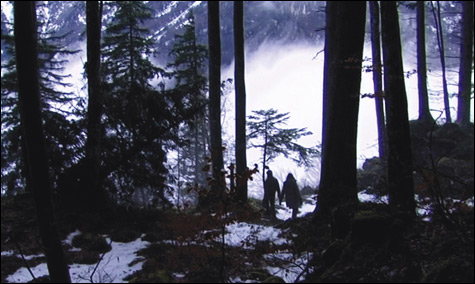
A LAKE: This one veers toward Sarunas Bartas's mute mysticism and Aleksandr Sokurov's landscape sorcery. |
An acquired taste in French cinema, Philippe Grandrieux is an abstractionist who does narrative features, a post-punk artiste as comfortable making Marilyn Manson music videos as he is war-zone documentaries. But his three major features — which the Harvard Film Archive is screening this weekend and next — revel in a dangerous minimalism. His is a world in which people do inexplicable things without speaking, and the visuals are often blurs — in other words, this is a kind of art cinema that could easily be mocked for its pretensions and its obscurity. Grandrieux is no opportunist, however, and his films are as much about seeing as they are about emotional states. Almost as a remedial recourse, his soundtracks are powerful affairs, often shedding on-location sound altogether and building a Lynchian storm of creepy ambient noise — as if the whole world were clamped beneath an old boiler that's about to blow.
It helps that he's latched onto sensational subjects. His first fiction film, SOMBRE (1998; February 21 at 7 pm), might be the most elusive serial-killer movie ever made as it follows a sex murderer (Marc Barbé) stumbling through the countryside. Grandrieux is interested less in explanations or gore then in qualm, and his strategy is passive-aggressive — Sombre is such an underexposed film, it often feels like a radio play. It's terrifyingly intimate; the camera stays so close during the murders that you feel you're caught in a headlock. Grandrieux's ideas of sociopathy are expressed in the visuals themselves, which are focus-challenged and handheld epileptic — that is, when the movie doesn't implode outright.
The whole thing is a portentous experience, particularly as it becomes clear that Sombre isn't a thriller at all. The anti-hero eventually meets up with an aging virgin (Elina Löwensohn), is mistaken by her and her nudist sister (Geraldine Voillat) for a reasonable romantic acquaintance, and is welcomed into their family's sphere. With almost imperceptible grace and logic, Grandrieux shifts the focus to Löwensohn's lonely spinster, who despite near-brushes with the maniac's homicidal impulses tries to accept him as her companion and her burden.
NEW LIFE (2002) is about sex trafficking in Eastern Europe, but the ruined landscape, evocation of criminal undergrounds, and reduction of humans to chattel is all so elliptical, the theme feels more like a personal nightmare than a social issue. Again, there's almost a genre plot at work — an American in Sofia (Zachary Knighton) falls for a kept prostitute (Anna Mouglalis) in a lurid nightclub and tries to wrest her from the mob — but Grandrieux is more interested in crazed textures, which this time do not reflect an unbalanced consciousness so much as the filmmaker's outrage over the bestial state of humanity.
A LAKE (2009) is a much more conscientiously arty film, veering toward Sarunas Bartas's mute mysticism and Aleksandr Sokurov's landscape sorcery and away from sex-scandal subject matter as it decamps to a mythologized swatch of wintertime woods where a cabin family's hardscrabble routine is disrupted by the arrival of a young stranger. Sporting less plot stuff but a relieving engagement with the misty terrain (the cinematography, by the filmmaker himself, is hypnotically gorgeous), A Lake has the simplicity of a folk tale, and, as always with Grandrieux, the subtractions add up to a puzzling but fascinating beauty.